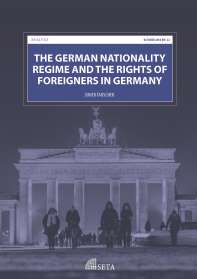Each state develops a citizenship definition according to its cultural values and historic phenomena. The citizenship definitions across the world can be categorized into three main groups. The first two are the recognition of citizenship on the basis of blood kinship (jure sanguinis) and birthplace (jure soli), which comprise the main types of citizenship, while the third one is the citizenship vested after birth (naturalization).
As of 1913, the Federal Republic of Germany defined citizenship on the basis of the principle of blood relation and conducted its politics and foreign relations accordingly. With a new regulation in 2000, the principle of birthplace became more prominent although the blood relation principle did not disappear. With this regulation, the obligation of choosing one nationality in the cases of dual citizenship started to be implemented. However, the obligation to choose between the two nationalities was not imposed on citizens of many countries, including citizens of EU member countries.
While the citizens of other nationalities were not obliged to conform to this law, immigrants working in Germany and contributing economically to the state and society had to give up their Turkish citizenships for their political rights, a situation which was highly debated and triggered discrimination.
The gradually increasing refugee inflow to Europe beginning in 2014 reached a peak in 2015 both in Europe and Germany, and provoked a different sociology of discrimination and marginalization. Moreover, due to the terrorist attacks in France and Belgium, refugees and newcomer Muslims are currently the main groups subjected to discrimination and exclusion; Turks and immigrant workers are now regarded as “native.” It is assumed that the movement of PEGIDA (Patriotic Europeans Against the Islamization of the West) emerged as a result of all these incidents. PEGIDA has been striving to find a societal base for Europe’s long-standing anti-Islamic stance.
This paper analyzes citizenship rights of migrants and foreigners in Germany in addition to policies of the country toward these social groups by also focusing on political and social transformation in Europe and specifically in Germany.



